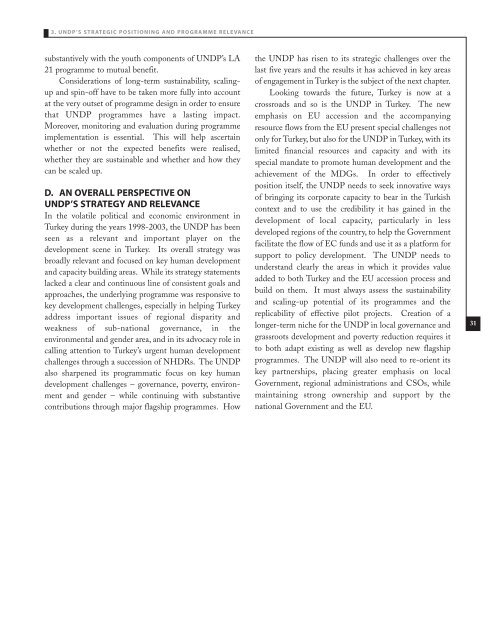Reports - United Nations Development Programme
Reports - United Nations Development Programme
Reports - United Nations Development Programme
You also want an ePaper? Increase the reach of your titles
YUMPU automatically turns print PDFs into web optimized ePapers that Google loves.
3. UNDP’S STRATEGIC POSITIONING AND PROGRAMME RELEVANCE<br />
substantively with the youth components of UNDP’s LA<br />
21 programme to mutual benefit.<br />
Considerations of long-term sustainability, scalingup<br />
and spin-off have to be taken more fully into account<br />
at the very outset of programme design in order to ensure<br />
that UNDP programmes have a lasting impact.<br />
Moreover, monitoring and evaluation during programme<br />
implementation is essential. This will help ascertain<br />
whether or not the expected benefits were realised,<br />
whether they are sustainable and whether and how they<br />
can be scaled up.<br />
D. AN OVERALL PERSPECTIVE ON<br />
UNDP’S STRATEGY AND RELEVANCE<br />
In the volatile political and economic environment in<br />
Turkey during the years 1998-2003, the UNDP has been<br />
seen as a relevant and important player on the<br />
development scene in Turkey. Its overall strategy was<br />
broadly relevant and focused on key human development<br />
and capacity building areas. While its strategy statements<br />
lacked a clear and continuous line of consistent goals and<br />
approaches, the underlying programme was responsive to<br />
key development challenges, especially in helping Turkey<br />
address important issues of regional disparity and<br />
weakness of sub-national governance, in the<br />
environmental and gender area, and in its advocacy role in<br />
calling attention to Turkey’s urgent human development<br />
challenges through a succession of NHDRs. The UNDP<br />
also sharpened its programmatic focus on key human<br />
development challenges – governance, poverty, environment<br />
and gender – while continuing with substantive<br />
contributions through major flagship programmes. How<br />
the UNDP has risen to its strategic challenges over the<br />
last five years and the results it has achieved in key areas<br />
of engagement in Turkey is the subject of the next chapter.<br />
Looking towards the future, Turkey is now at a<br />
crossroads and so is the UNDP in Turkey. The new<br />
emphasis on EU accession and the accompanying<br />
resource flows from the EU present special challenges not<br />
only for Turkey, but also for the UNDP in Turkey, with its<br />
limited financial resources and capacity and with its<br />
special mandate to promote human development and the<br />
achievement of the MDGs. In order to effectively<br />
position itself, the UNDP needs to seek innovative ways<br />
of bringing its corporate capacity to bear in the Turkish<br />
context and to use the credibility it has gained in the<br />
development of local capacity, particularly in less<br />
developed regions of the country, to help the Government<br />
facilitate the flow of EC funds and use it as a platform for<br />
support to policy development. The UNDP needs to<br />
understand clearly the areas in which it provides value<br />
added to both Turkey and the EU accession process and<br />
build on them. It must always assess the sustainability<br />
and scaling-up potential of its programmes and the<br />
replicability of effective pilot projects. Creation of a<br />
longer-term niche for the UNDP in local governance and<br />
grassroots development and poverty reduction requires it<br />
to both adapt existing as well as develop new flagship<br />
programmes. The UNDP will also need to re-orient its<br />
key partnerships, placing greater emphasis on local<br />
Government, regional administrations and CSOs, while<br />
maintaining strong ownership and support by the<br />
national Government and the EU.<br />
31

















